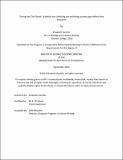| dc.contributor.advisor | O'Connor, M. R. | |
| dc.contributor.author | Gamillo, Elizabeth | |
| dc.date.accessioned | 2023-11-02T20:10:19Z | |
| dc.date.available | 2023-11-02T20:10:19Z | |
| dc.date.issued | 2023-09 | |
| dc.date.submitted | 2023-06-08T15:17:32.553Z | |
| dc.identifier.uri | https://hdl.handle.net/1721.1/152713 | |
| dc.description.abstract | Soundscapes of the world can reveal the status of an ecosystem to an ecologist, much like how a cardiologist can distinguish abnormal heart murmurs with an electrocardiogram. The effort to use the aural landscape to assess the recovery of fragile ecosystems and directly assist in those recoveries is becoming a movement within ecology. The audio recorder has become an increasingly powerful tool at a time when catastrophic heatwaves, wildfires, floods, and extreme weather increase in severity and occurrence. The soul-stirring calls of animals and the mechanical hum or the roar of cars and planes, all engulfed by the swift and rhythmic sounds of wind and water flow, generate a unique score that researchers collect to note unique rhythms and patterns in the cacophony of these landscapes.
Altered soundscapes are often the first detectable changes in an ecosystem facing threats. By strapping recorders onto trees or tripods, scientists can also track how ecosystems change in response to human disruptions, like air traffic and logging, or track biodiversity and shifts brought on by climate change. Collecting and archiving the baseline data of sounds that can be visited and studied, much like preserved specimens in a natural history museum, is crucial before they disappear or change forever. Together, these scientists are creating a record for the future. It's the sound of this moment, frozen forever as audio files. And they hope that someone can use it to travel back to the world as it was in this instant—and help preserve the ecosystems they love. | |
| dc.publisher | Massachusetts Institute of Technology | |
| dc.rights | In Copyright - Educational Use Permitted | |
| dc.rights | Copyright retained by author(s) | |
| dc.rights.uri | https://rightsstatements.org/page/InC-EDU/1.0/ | |
| dc.title | Tuning Into The Planet: Scientists are collecting and archiving soundscapes before they disappear | |
| dc.type | Thesis | |
| dc.description.degree | S.M. | |
| dc.contributor.department | Massachusetts Institute of Technology. Program in Comparative Media Studies/Writing | |
| dc.contributor.department | Massachusetts Institute of Technology. Graduate Program in Science Writing | |
| dc.identifier.orcid | https://orcid.org/0000-0001-6753-2990 | |
| mit.thesis.degree | Master | |
| thesis.degree.name | Master of Science in Science Writing | |
